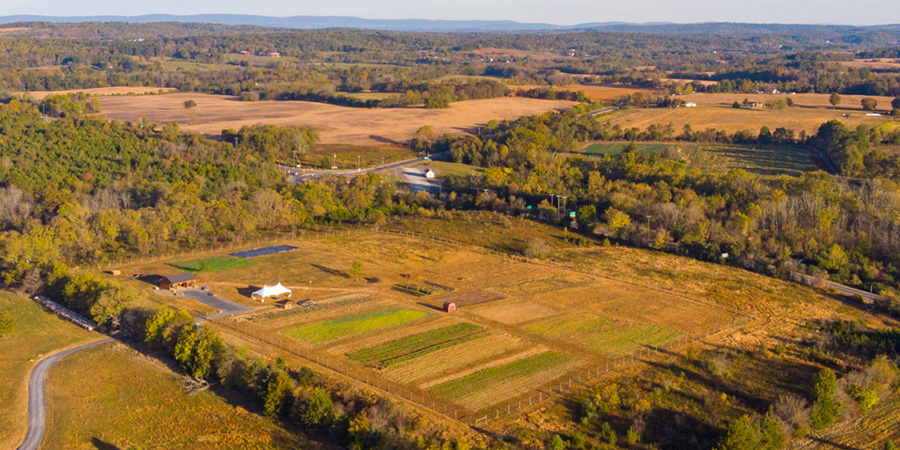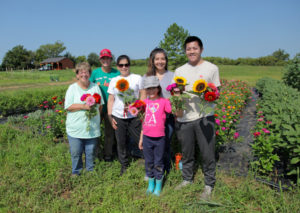
Loudoun County is one of the most affluent counties in the nation and simultaneously home to some 14,000 people without reliable access to affordable, nutritious food. It is consistently one of the fastest-growing counties in the nation, and yet over 200,000 acres is planned to remain rural with over 58,000 acres of permanently conserved open space. Nestled among the three roundabouts of Routes 15 and 50 and Howser’s Branch Road, lies PEC’s Community Farm. Located at the literal intersection of suburban and rural Loudoun County, it is perfectly positioned both to shine a light on the value of conservation and to make practical, tangible progress to address food insecurity in the community.
The inspiration for the Community Farm at Roundabout Meadows is the Fauquier Education Farm, a few miles outside Warrenton. In a single growing season there, volunteers grew and donated more than 60,000 pounds of produce to food banks in Fauquier, Culpeper and Rappahannock counties. “I thought we could do something similar in Loudoun County, create a working farm that would help address food insecurity in Loudoun while also giving nearby suburban communities a way to connect with the land and open space,” said PEC President Chris Miller. “Come, help us grow food for our neighbors who need it the most, and along the way, you’ll learn about growing vegetables, and maybe you’ll get hooked on being in the garden.”
“We hope this can be a place to connect people to the landscape, to show the public the benefits of land conservation and restoration of native habitat, and to save important historic and cultural resources before it is lost.”
– Chris Miller
And come, they did. In spring 2019, farm manager Dana Melby opened the gates to 171 community volunteers who donated 544 hours of time planting, growing, and harvesting 4,711 pounds of produce, all donated to Loudoun Hunger Relief. “We grew a little of everything this year, the full market garden—tomatoes, peppers, eggplant, tomatillos were all really good. We also grew cucumbers, watermelon, cantaloupe, squash zucchini, some green beans,” Dana said.
The 1.3-acre farm’s production plan was tailored to complement what other nonprofit farms were producing and to provide the community what they wanted most. Dana spent several days last winter talking to Loudoun Hunger Relief clients. “They are big cooks who do a lot of home meal preparation. Besides what we planted, they were also asking for spinach, lettuce, and other greens, which we couldn’t do this year because we don’t have the cold storage.”
With the first growing season and a lot of learning experiences behind us, Dana is excited about increasing the harvest and improving just about every aspect of the farm next year. “Cover crops and other best management practices will improve the quality of the soil. We’ll double the planting area to three acres and add new varieties after learning what grows well and what is vulnerable to disease and other issues. A new greenhouse will allow us to do multiple plantings throughout the season. And our wonderful volunteer from George Mason University created recipe cards to help people try less familiar vegetables, such as bok choy,” said Dana, who expects next year’s harvest to more than double our contribution to Loudoun Hunger Relief.
The new greenhouse, which has been named in honor of Phyllis Mills Wyeth, will do more than increase the harvest; it will also create more opportunities for community members to get involved. “We’ll be able to host volunteers throughout the winter and start our volunteer programs for next season as early as January,” Dana said. “Of the 171 volunteers this year, 41 came back repeatedly throughout the season.” Volunteers, most of whom had no prior connection to PEC, included the Western Loudoun Learning Cooperative, Brambleton Middle School, Loudoun and Frederick county high schools, retirees, and individuals who are just passionate about the mission of the farm.

PEC hopes the farm and its surrounding 325 undeveloped acres will stir up passion for open space as well. The land at Gilbert’s Corner was donated to PEC five years ago, at a time when most similar east-west and north-south intersections, such as in nearby Haymarket, were being rapidly developed. “Here is a major intersection that was also part of the Journey Through Hallowed Ground National Scenic Byway and National Heritage Area. We hope this can be a place to connect people to the landscape, to show the public the benefits of land conservation and restoration of native habitat, and to save important historic and cultural resources before it is lost,” Chris said.
In just one season, the community farm has shown us clearly that the benefits extend far beyond improving soil health and water quality, or sustaining traditional agriculture. Chris continued, “We’ve created a platform at the farm where volunteers can make a huge difference for their community and where we are hopefully inspiring a new generation of conservation stewards.”
Community members and organizations, school groups, and others who want to volunteer or learn more about the Community Farm can visit pecva.org/volunteer or contact Community Farm Manager Dana Melby at (540) 347-2334 ext. 7068 or [email protected]
